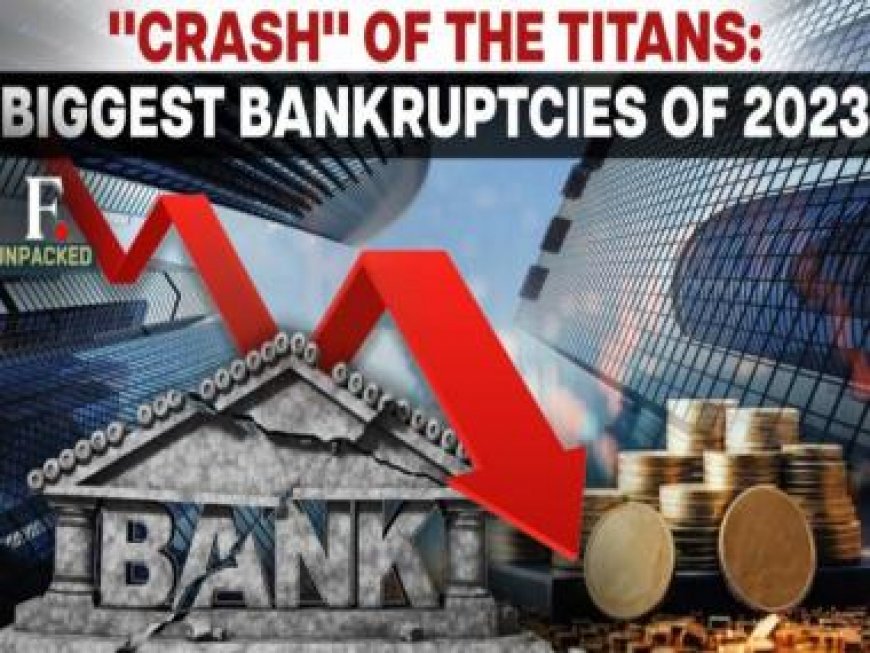Rewind 2023: The year big corporate titans went bankrupt
Rewind 2023: The year big corporate titans went bankrupt

2023 is on its final leg and there’s lots to remember the year by. One of them will be the swathes of corporate bankruptcy filings throughout the year. Reports say, US bankruptcy filings are set to hit their highest this year since 2020. Meanwhile, statistics published by the US court system in September showed that corporate bankruptcies in the US rose by 30 per cent in the past 12 months.
Here’s a list of some of the notable companies that went down this year:
Why WeWork didn’t work
Co-working space provider WeWork was the latest company to succumb to bankruptcy. Pressured by a large debt pile and soaring losses amid declining demand, WeWork sought bankruptcy protection in November this year.
Founded by Adam Neumann in 2010, WeWork aimed to revolutionise the shared working space sector. In 2019, it grew to become the most valuable US start-up that was worth a whopping $47 billion. In the same year, WeWork filed for an initial public offering (IPO) and investors waited for a peak into the company. But then all hell broke loose when Neumann was accused of mismanagement and bad behaviour.
Within 33 days the IPO was quashed, WeWork’s valuation plummeted by more than 70 per cent and Neumann, who wanted to become the world’s first trillionaire, was ousted as the firm’s CEO.
In the years that followed, WeWork made a series of challenging and arguably bad decisions. Expensive leases and a declining demand weighed heavily on the company which eventually resulted in its meteoric fall.
Evergrande: The poster child of China’s property crisis
Evergrande is a name that has become synonymous with China’s failure. At one point Evergrande was China’s second-largest property developer, perhaps even its largest. But it all came crashing down in 2020 when Beijing introduced new rules to regulate the property sector.
One may argue that was perhaps the beginning of the end for Evergrande. The regulatory crackdown pushed the firm into a liquidity crunch following which it flagged inability to make interest repayments. Now, with around $300 billion in liabilities, it stands at the centre of China’s property crisis.
Evergrande’s fall opened up a Pandora’s box of issues, with the firm becoming a wrecking ball for China’s economy. The property sector accounts for roughly a quarter of China’s GDP and the property bigwig’s fall became one of the predominant reasons for a decline in its economy. In August this year, Evergrande filed for bankruptcy in New York, to protect its US assets as it works on a multi-billion-dollar deal with creditors.
Bed Bath & Bankruptcy
American retailer Bed, Bath & Beyond suffered a rather tragic death. The half-a-century-old retailer rose to fame in the 1990s. It became America’s go-to shopping destination for home goods. But in April this year, it filed for bankruptcy. However, Bed Bath & Beyond’s failure was not a surprising one.
In January 2023, the retailer warned that it was running out of cash and may fail to continue operations. The warning briefly jolted financial markets with the company’s share prices plummeting. However, the looming threats only materialised in April this year when it filed for bankruptcy.
There are several reasons that contributed to Bed, Bath & Beyond’s failure. While demand for its products was declining, the rise of online marketplaces also weighed heavily against the retailer. With diminishing capital, the company’s costs surpassed its revenue and to top it all off, Bed Bath & Beyond failed to secure enough funds to keep its business afloat. That, perhaps, was the final nail in the coffin for the beleaguered retailer.
SVB: The frontrunner Is US’ bank run
The year started off on a rocky road marking one of the worst years for banks since the 2008 financial crisis. Jitters in the U.S. banking system spilled over into Europe causing Switzerland’s scam-ridden crown jewel Credit Suisse to collapse.
Meanwhile, back in the US, Wall Street saw a wave of consecutive bank runs amid soaring interest rates. America’s banking sector was rattled throughout March. Banks collapsed one after another with worried customers rushing to withdraw their funds. Much of the hullaballoo in the sector began with the fall of the SVB Financial Group whose bankruptcy was ignited by the fall of its subsidiary Silicon Valley Bank.
On March 10, federal regulators took over Silicon Valley Bank after its investments greatly declined in value amid rising interest rates in the US No sooner than Silicon Valley Bank was taken over, its parent SVB Financial collapsed. On March 17, SVB Financial Group filed for bankruptcy.
As we approach 2024, the wave of bankruptcies is likely to stretch into the coming year. However, analysts expect the pace of filings to slow down. The US Federal Reserve says it is unlikely to hike rates further which is expected to relax the monetary policy and that will likely offer some respite to the companies.
What's Your Reaction?

























































